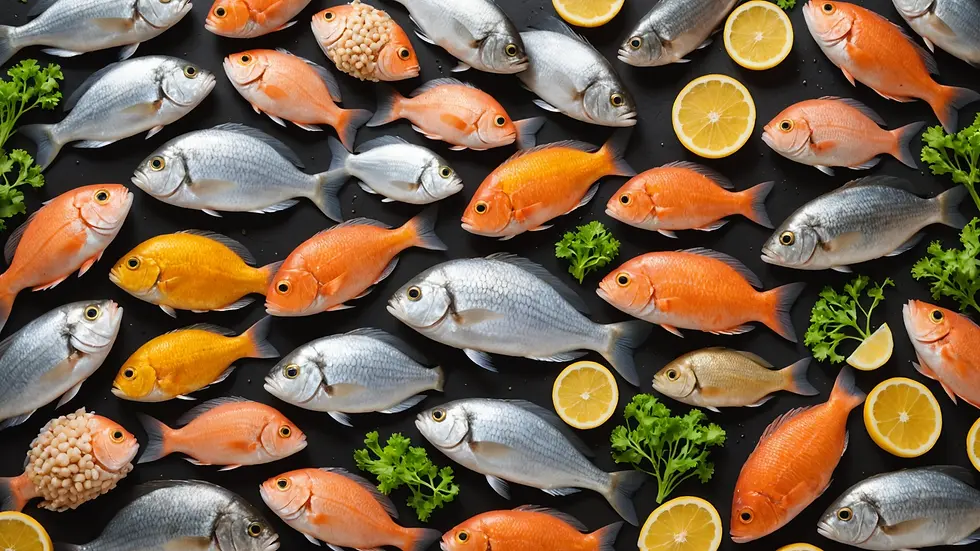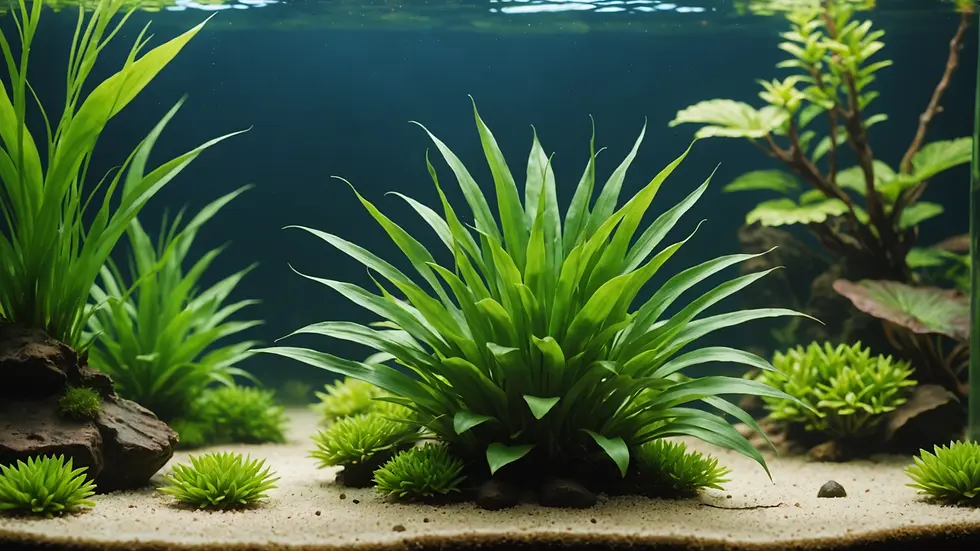What Are the Essential Nutritional Needs for Fish?
- Jyotiraj Borah
- Feb 7
- 4 min read
Fish are not just captivating creatures to admire in aquariums; they form a vital part of our ecosystems and human diet. Knowing their nutritional requirements is essential for their health, longevity, and overall well-being in various settings, be it an aquarium, fish farm, or natural habitat. Let’s make sure your fish are thriving by diving into their essential nutritional needs.
The Importance of Nutrition in Fish
Proper nutrition is critical across all life stages of fish. A balanced diet influences their growth, immune system, reproductive success, and overall health. Studies show that fish with adequate nutrition are less susceptible to diseases, making them more resilient to environmental challenges.
For instance, aquaculture research indicates that optimal feeding can enhance growth rates by as much as 30% and reduce mortality rates significantly. This knowledge is valuable not only for aquarists but also for commercial fish farmers who want to maximize production efficiency.
Macronutrients: The Building Blocks of Fish Diet
To meet the nutritional needs of fish, we can categorize nutrients into macronutrients and micronutrients. Macronutrients include proteins, carbohydrates, and fats, each serving unique roles crucial for fish health.
Proteins
Proteins are critical for all fish species. They are necessary for tissue building, muscle growth, and repair. Fish require protein not only for their physical structures but also for enzymes and hormones.
The protein requirement typically ranges from 25% to 50% of their diet, depending on the species. For example, tilapia may require around 30% protein, while carnivorous fish like salmon might need up to 50%. Quality protein sources include fish meal, shrimp meal, and even plant-based options like soybean meal.

Carbohydrates
While fish do not have a strict need for carbohydrates, these can still provide energy and assist in balancing their diet. For instance, using digestible carbs such as corn and wheat can help create a more rounded nutritional profile.
Studies show that including easily digestible carbs can improve the health of herbivorous fish species without leading to excess weight. Aim for options like grains, vegetables, and algae to fulfill this need.
Fats
Fats are another significant aspect of fish diet. They provide concentrated energy and facilitate the absorption of essential vitamins (A, D, E, and K). Essential fatty acids, particularly omega-3 and omega-6, are vital for optimal fish health.
Typically, fish diets should include about 5% to 20% fat. Sources like fish oil and vegetable oils are excellent choices. Research shows that diets enriched with omega-3 fatty acids can enhance fish growth by 40% compared to low-fat diets.
Micronutrients: Vitamins and Minerals
Alongside macronutrients, fish also require various vitamins and minerals to maintain health. These micronutrients may be needed in smaller quantities, but they are just as essential for many bodily functions.
Vitamins
Fish need several important vitamins, including:
Vitamin A: Critical for growth and maintaining good vision.
Vitamin D: Assists in calcium absorption for stronger bones.
Vitamin E: Acts as an antioxidant and supports reproductive health.
Many fish can obtain these vitamins naturally through their diet or from commercial feeds fortified with essential nutrients.
Minerals
Minerals provide numerous physiological benefits. Important minerals for fish include:
Calcium: Vital for bone structure and density.
Phosphorus: Crucial for energy transfer in the body.
Iron: Responsible for oxygen transport in the bloodstream.
Fish get these minerals either from their diet or directly from additives in their feed, emphasizing the need for comprehensive ingredient evaluation.
Special Nutritional Needs of Different Fish Species
Different types of fish have unique dietary requirements shaped by their natural habits. Understanding these specific needs is crucial for effective care.
Carnivorous Fish
Carnivorous species, such as bass and pike, eat mostly other fish in the wild. Their diets need a higher protein and fat ratio, with limited carbohydrates. High-quality fish meal is usually included in their feed to meet these needs.
Herbivorous Fish
Species like tilapia rely primarily on aquatic plants and algae. They need higher carbohydrate levels than carnivorous fish. A plant-rich diet combined with sufficient protein can keep herbivorous fish healthy and thriving.
Omnivorous Fish
Omnivores, including goldfish and cichlids, can consume a mix of plants and animal matter. This flexibility allows for a broader dietary spectrum, vital for their growth and health. A balanced mix of proteins, carbohydrates, and fats should be included to cater to their diverse needs.
Feeding Practices and Strategies
To provide effective nutrition to fish, consider these key practices:
Balanced Diets
Choose a well-rounded feed that offers a healthy combination of proteins, fats, carbohydrates, vitamins, and minerals. Evaluate the nutritional content of commercial feeds, ensuring they meet the unique needs of your fish species.
Proper Feeding Frequency
Feeding frequency should depend on the type, age, and size of the fish. For instance, juvenile fish may need several small meals daily, while adults can thrive on one or two meals a day.
Appropriate Portions
Avoid overfeeding, which can lead to waste and poor water quality. Instead, offer portions that fish can consume within a few minutes, reducing the chances of leftover food.

Environmental Factors Affecting Nutrition
Beyond diet, various environmental factors can impact fish nutrition:
Water Quality
Good water quality directly influences fish health and their ability to extract nutrients from food. Important parameters include temperature, pH, and ammonia levels, all of which must be monitored carefully.
Stress
Stressful conditions can decrease fish appetite, leading to nutritional deficiencies. Factors such as poor water conditions, overcrowding, and sudden environmental changes can contribute to stress levels.
Availability of Natural Food Sources
In the wild, the presence of natural food sources directly affects nutritional intake. Habitat loss and pollution can limit food availability, negatively impacting fish health over time.
Key Takeaways for Fish Nutrition
A solid understanding of fish nutritional needs is crucial for their care and cultivation. By balancing macronutrients and micronutrients tailored to individual species, aquarists and fish farmers can foster strong, healthy fish.
Implementing best feeding practices and considering the overall environment will help ensure fish remain vigorous and bright, whether in an aquarium or in their natural habitats. While fish nutrition may seem complex, it can be straightforward. With diligence and knowledge, enhancing the life of aquatic companions is entirely achievable.

Navigating fish nutrition might seem challenging, but it leads to rewarding outcomes. Providing the right nutrients greatly contributes to the well-being and sustainability of these marvelous animals, enriching not only their lives but ours as well.




Comments